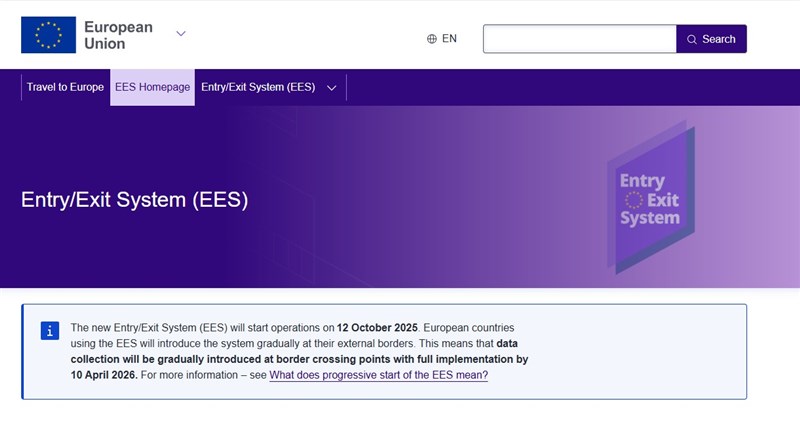
Taipei, Oct. 7 (CNA) Taiwanese travelers planning trips to Europe are advised to prepare for the European Union's new Entry/Exit System (EES), which will take effect next week and may require biometric data collection at border checkpoints, a Taiwanese diplomat said Tuesday.
Eric Huang (黃鈞耀), head of the Ministry of Foreign Affairs' (MOFA) Department of European Affairs, said at a briefing that the EES will take effect on Oct. 12 and undergo a six-month trial period, with full implementation expected around April 10, 2026.
The EES is an automated system designed to collect the personal data of nationals from outside the European Union (EU) or Schengen Area when they enter or exit the zone.
It will digitally record each traveler's entry, exit, and length of stay in the Schengen Area, while collecting their travel document details and biometric data -- namely, fingerprints and facial images -- to enhance border security and streamline immigration checks, according to the EU website.
The system will replace the current practice of manually stamping passports of non-EU and non-Schengen travelers, the website said.

At Tuesday's press briefing, Huang noted that as the new policy includes a six-month grace period and each Schengen country may roll out the system on a different schedule, MOFA advises Taiwanese travelers to stay informed, check with their destinations in advance, and allow extra time for customs clearance.
Huang also noted that three Schengen countries -- the Czech Republic, Italy and Germany -- allow Taiwanese passport holders to use automatic immigration clearance systems, or e-gates.
After the launch of the EES, however, travelers eligible for e-gate use will first need to have their biometric data collected before they can continue using the service, he said.
The Czech Republic will temporarily suspend its e-gate service until further notice due to system integration issues, he added.
For more detailed information, Huang recommended checking the EU website or contacting the representative offices of the relevant European countries in Taiwan.
Since Jan. 11, 2011, Taiwanese passport holders have been exempt from visa requirements for short-term stays in the Schengen Area -- currently consisting of 29 European countries -- for up to 90 days within a six-month period.
- Society
Five people injured in suspected gas blast at 2 restaurants in Banqiao
12/08/2025 11:14 AM - Society
Taiwan headline news
12/08/2025 10:22 AM - Business
U.S. dollar lower in Taipei trading
12/08/2025 10:14 AM - Business
Taiwan shares open higher
12/08/2025 09:08 AM - Society
Taipei rally voices migrant workers' anger over work-year limit
12/07/2025 09:34 PM